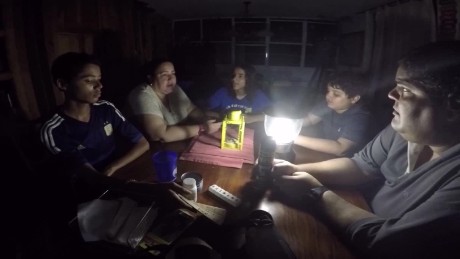
Even if you don’t live in a hurricane zone, what happened to the people of Puerto Rico — even months after the initial hurricane damage — holds several useful lessons for the attentive prepper. The storm trashed the island’s power grid. Months later, thousands of Puerto Ricans still remain without power.
Lesson One: Crime and Chaos are not an instantaneous “givens.”
As a writer of post-apocalyptic fiction, the most interesting takeaway was the absence of Mad Max. By and large, Puerto Ricans did not devolve into savage gangs days — or even months — after the destruction. Cultural inertia for getting along and cooperating kept civilization in place. Post-Maria Puerto Rico did not turn into a savage Mad Max wasteland of kill or be killed. There was a report of a gun-wielding man demanding first dibs on gas at a gas station. One woman heard about four people breaking into an apartment. CNN carried a story about looters stripping a grocery store. There’s some level of crime that’s always with us. Expect some crime, but not chaos.
Lesson Two: Expect to be ignored
Even allowing for the limitations of resupplying an island, the relief and repair efforts in Puerto Rico were slow. Part of the problem was that FEMA really cannot handle a large crisis as well as people would like to think. Months later, there are still parts of Puerto Rico without power or water or any government assistance. The vast majority of efforts have been directed at the cities. Granted, that is where the majority of the people are, so it makes some sense. But, the takeaway is that if you don’t live in a big city, you’d better be prepared to take care of yourself. The government won’t be getting to you for a long time.
Lesson Three: Have food and water stored
In the immediate aftermath of the storm, roads were blocked, power was out. Stores were quickly stripped. Few imagined that it would take so long for aid to arrive. Many grew desperate. FEMA suggests having a three-day supply of food and water on hand. Puerto Rico shows that you might well be waiting weeks, not days.
My wife pointed out that many Puerto Ricans were poor. They did not have the extra cash to buy the luxury of several weeks’ worth of extra food. While that is undoubtably true, the vast majority of mainland Americans DO have the resources. Do they have their emergency food stored?
Lesson Four: Have a way to purify water
The storm washed a lot of bad things into the island’s creeks and rivers. Bacteria in animal urine was particularly dangerous. With the power out, many people took water from the creeks. Many got very sick. Without power and water for washing machines, people would bathe and wash clothes in the creeks. Farther downstream, someone would be pull out buckets of that same creek water for drinking.
There are two related lessons here. One is to have alternate sources of water, such as having fifty gallons stored. Have a rain barrel. Have an off-grid method of pumping from your well. Two, is to realize that your own water source could get compromised too — even if your well still works. Have ways to purify your water: boiling, bleach, tablets, whatever.
Lesson Five: Have alternatives for power.
A few Puerto Ricans had generators but found out that fuel to run them was hard to come by. Flashlights and lanterns ran out of batteries. Have an alternate means to cook and boil water. Have a couple oil lamps and spare oil for light. Have some solar charging capability — even if it is just to recharge phones or AA batteries.
Summary:
Back to Lesson’s One and Two, Puerto Rico suggests that civilization will persist, but aid from outside will probably be very slow. Prepare to take care of yourself (food, water, power). Be ready to defend your family and supplies, but don’t freak out over the prospect that hordes of savages will surround your house.
Keep calm and store supplies.
